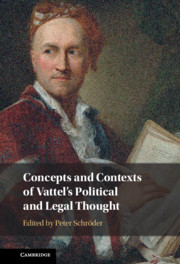Book contents
- Concepts and Contexts of Vattel’s Political and Legal Thought
- Concepts and Contexts of Vattel’s Political and Legal Thought
- Copyright page
- Contents
- Contributors
- Acknowledgements
- Concepts and Contexts of Vattel’s Political and Legal Thought
- Part I Historical and Intellectual Contexts
- 1 In Search of a Nation
- 2 Sovereignty Contested
- 3 The Development of the Law of Nations
- 4 Vattel and the Abbé de Choisy
- 5 Vattel and the Seven Years’ War
- Part II Concepts
- Part III Receptions
- Index
- References
2 - Sovereignty Contested
Vattel’s Use of Leibniz, Hobbes, and Pufendorf
from Part I - Historical and Intellectual Contexts
Published online by Cambridge University Press: 11 June 2021
- Concepts and Contexts of Vattel’s Political and Legal Thought
- Concepts and Contexts of Vattel’s Political and Legal Thought
- Copyright page
- Contents
- Contributors
- Acknowledgements
- Concepts and Contexts of Vattel’s Political and Legal Thought
- Part I Historical and Intellectual Contexts
- 1 In Search of a Nation
- 2 Sovereignty Contested
- 3 The Development of the Law of Nations
- 4 Vattel and the Abbé de Choisy
- 5 Vattel and the Seven Years’ War
- Part II Concepts
- Part III Receptions
- Index
- References
Summary
The modern state is the institution to which human beings have entrusted the coercive power they deem necessary and legitimate to regulate the lives that they lead together in a bounded community. The name for the legitimate coercive power of the modern state is sovereignty. The state is sovereign internally because it possesses the effective monopoly on this legitimate coercive power within its own clearly demarcated territory; it gives force to the law that it makes. It is also sovereign internally because it is the only author of the laws that have jurisdiction within its territory. The state is sovereign externally because its monopoly of power within its boundaries excludes its domination by or dependence upon any other state. It is also sovereign externally because its sole authority over itself means that it brooks no interference from other states affecting its constitution or government, and nor does it accept the writ of other states. It is, in short, subject to no other power or authority and must chart its own course as a free actor on the world stage. Finally, the modern state is externally sovereign because it is the only entity in a position reciprocally to recognise others as its sovereign equals. There is no higher authority from which a modern state may draw its claim to assume for itself the powers of the earth.
- Type
- Chapter
- Information
- Publisher: Cambridge University PressPrint publication year: 2021

